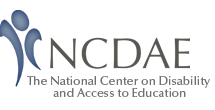NCDAE Accessibility Newsletter - June 2006
In this Edition:
- Feature Article - Cognitive Disabilities and the Web
- Tips and Tools - Content Management Systems
- Webcasts - Webcast Poll
- Factoid
- Upcoming Events
- Affiliate Corner - Carol Price
- In The News - All About AJAX
Featured Article
Cognitive Disabilities and the Web: Where Accessibility and Usability Meet?
For many, web accessibility begins and ends with making a site accessible to someone using a screen reader. However, according to the US Census Bureau, 14.3 million Americans age 15 and over have a mental disability. This includes 1.9 million who have Alzheimer's disease, senility or dementia, and 3.5 million with a learning disability. Making the web accessible to this population has, for the most part, been overlooked.
Accessibility for users with cognitive disabilities can be a far greater challenge than that of other types of disabilities. Common types of cognitive disabilities include: intellectual disabilities, language and learning difficulties, head injury, stroke, Alzheimer’s disease, and dementia. These conditions can affect memory, perception, conceptualization and problem solving as well as attention, concentration, executive functions, language abilities, emotion, and behavior. Furthermore, accessibility features that make it easier for one user can often make things more difficult for another user. In fact, recommendations for one problem are often in direct contradiction to the recommendations for others.
In general, web accessibility for physical disabilities relatively straightforward: it either works with a screen reader or it doesn’t ; a video or audiocast has captions or it doesn’t; a person with mobility limitations can move through a site or they can’t. However, given the diversity of conditions, finding a prescriptive solution for cognitive accessibility seems almost impossible – there is no rubric that covers even the basics! While empirical research is just starting to be done in this area, many experts offer suggestions that can make websites easier for users with cognitive disabilities to use. In fact, most of these suggestions make the web easier for everyone to use! Many of these expert’s recommendations are basic usability principles.
Usability and accessibility, while in the same general family, are distinctive concepts – cousins in the world of User Centered Design. However, when it comes to cognitive disabilities, the lines blur. Can usability principles be used to help increase the accessibility of the web to persons with cognitive disabilities?
This article looks at basic usability concepts in conjunction with recommendations made for improving accessibility for users with cognitive disabilities. To read the entire article, visit: http://ncdae.org/tools/cognitive/
Tips and Tools
Content Management Systems and Accessibility
Almost every large organization uses some sort of Content Management System (CMS). A CMS is a tool or set of tools designed to help create, edit, organize and present information on the web. There are dozens of Content Management Systems available, and while each has its differences
and many have accessibility limitations, there are some general principles that can often be applied to increase CMS accessibility. We have created a fact sheet with the following resources:
• Advantages and disadvantages of open source vs. commercial Content Management Systems.
• General principles and techniques that may help improve the accessibility of your CMS.
• A list of popular Content Management Systems with links to their accessibility statements, resources and/or communities.
For more information visit http://ncdae.org/tools/factsheets/cms.php
Webcasts
Webcast Poll
Your opinion matters! What topics would you like to hear discussed in NCDAE Webcasts?
NCDAE sponsors bi-monthly webcasts related to accessibility and policy in technology mediated education. Past webcasts include:
- Mobile Education and Access for Students with Disabilities
- NIMAS in IDEA, What You Need To Know Now
- Student Information Systems and Individuals with Disabilities
- Electronic Accessibility in Library and Information Services
- Accessible Distance Education Technologies and Techniques
- Computer-based Assessment and Testing: Access or Accommodation
- Electronic Accessibility in Science, Technology, Engineering, and Mathematics
- Research and Development of Accessible Technologies
- Accessible Education Policy: Points of Possible Influence
Transcripts and recordings of past webcasts can be found at: http://ncdae.org/activities/#webcast
Please let us know what issues you would like to see included in future Webcasts: http://ncdae.org/webcasts/webcast_survey.php
Factoid
The PEW Internet and American Life Project report "The Internet’s Growing Role in Life’s Major Moments" highlights a survey on the growing importance of the internet on decision making. According to this report:
The internet has become increasingly important to users in their everyday lives. It is also the case that for many of online Americans, the internet has become a crucial source of information at major moments and milestones in their lives.
Our surveys show that 45% of internet users, or about 60 million Americans, say that the internet helped them make big decisions or negotiate their way through major episodes in their lives in the previous two years.
To explore this phenomenon, we fielded the Major Moments Survey in March 2005, that repeated elements of an earlier January 2002 survey. Comparison of the two surveys revealed striking increases in the number of Americans who report that the internet played a crucial or important role in various aspects of their lives. Specifically, we found that over the three-year period, internet use grew by:
- 54% in the number of adults who said the internet played a major role as they helped another person cope with a major illness. And the number of those who said the internet played a major role as they coped themselves with a major illness increased 40%.
- 50% in the number who said the internet played a major role as they pursued more training for their careers.
- 45% in the number who said the internet played a major role as they made major investment or financial decisions.
- 43% in the number who said the internet played a major role when they looked for a new place to live.
- 42% in the number who said the internet played a major role as they decided about a school or a college for themselves or their children.
- 23% in the number who said the internet played a major role when they bought a car.
- 14% in the number who said the internet played a major role as they switched jobs.
As the internet becomes a resource for vital information, it is essential to ensure that critical information on the web is accessible to people with disabilities.
To read the full report, visit: http://www.pewinternet.org/PPF/r/181/report_display.asp
Upcoming Events
AHEAD 2006
Jonathan Whiting of NCDAE and WebAIM will be attending AHEAD (Association on Higher Education and Disability) conference July 17-22 in San Diego. If you are attending the conference and would like to contact Jonathan, please visit http://www.ncdae.org/community/contact2.php?id=10
ATIA 2007
NCDAE will be hosting a ministrand on Accessible Distance Education at ATIA (Assistive Technology Industry Association) 2007 conference in Orlando, Florida. The conference will be held January 24-27, 2007. For more information, visit http://www.atia.org/conf_2007.html.
Affiliate Corner
 Affiliate Highlight - Carol Price
Affiliate Highlight - Carol Price
Carol Price is a professional special educator and Master-Mentor Teacher who is the Director of Alternate Assessment for one of the leading large-scale assessment developers in the country, Data Recognition Corporation.
Background
Carol Price, a native of New Orleans, Louisiana, graduated with a Bachelor of Education Degree from Washburn University of Topeka, Kansas. She also possesses two Master of Education Degrees from the University of New Orleans, one in Special Education and one in Leadership and Supervision. Carol is also a certified Project Management Professional, having acquired her PMP from Project Management International. Carol has had a quite lucrative career in education; she has experience working with students of all ages and grade levels, with and without disabilities. She has provided technical assistance to general and special educators across the nation. After the authorization of IDEA 1997, Carol was hired by the Louisiana Department of Education to develop the first alternate assessment for the state of Louisiana. This experience brought her to her current position at Data Recognition Corporation.
Research Interests
Having a passion for research, Carol’s current interests involve the development of accessible online formative and summative assessments. She is particularly knowledgeable about accommodations and accessibility for both online and paper-and-pencil large-scale assessments.
Projects
Data Recognition Corporation provides full-service, customized solutions for large-scale, statewide educational testing programs in the following areas: test development, project management, performance assessment (scoring of open-ended responses and writing assessments), psychometric services (statistical analysis and measurement), standard setting, operations, document production, online- and paper-based reporting systems, web-based solutions, and Adequate Yearly Progress (AYP) & state accountability systems consultation.
DRC currently supports eight State Departments of Education, which includes services for two states ranked in the top three of the nation (South Carolina and Louisiana). In 2006, DRC will process over 8.5 million secure documents for 5 million students.
In the News...
All About AJAX
According to Wikipedia:
Ajax, shorthand for Asynchronous JavaScript and XML, is a Web development technique for creating interactive web applications. The intent is to make web pages feel more responsive by exchanging small amounts of data with the server behind the scenes, so that the entire web page does not have to be reloaded each time the user makes a change. This is meant to increase the web page's interactivity, speed, and usability. The first known use of the term in public was by Jesse James Garrett in his February 2005 article Ajax: A New Approach to Web Applications
AJAX is actually a combination of technologies such as JavaScript and XML which allows web developers to create webpages that are dynamic and easily updated without having to refresh the page. It has been embraced my many developers as a the next step in the internet evolution. AJAX is behind the high-profile sites created by Google such as Gmail, Personalized Home Pages, Google Maps and the new Google Calendar. However, there is some question as to the accessibility of AJAX. JavaScript, an integral component of AJAX is not yet fully accessible making it difficult to ensure that accessibility is inherent in AJAX driven pages. Therefore, web developers need to be especially aware when taking advantage of the benefits of AJAX that they do not exclude users with disabilities.
Recent articles featured on the NCDAE RSS Feeds include:
AJAX is Cleaning Up
http://www.accessiblecontent.com/online/v2n1/index.php?view=ajax
AJAX, JavaScript support and screen reader accessibility
http://www.456bereastreet.com/archive/200605/ajax_javascript_support_and_screen_reader_accessibility/
Scared of the Dark? The impact of web 2.0 and/or AJAX-based web applications - from the point of view of a blind user, not a standardista (for a change)
http://www.webstandards.org/2006/05/10/scared-of-the-dark/
Joe Clark on AJAX
http://accessify.com/2006/05/joe-clark-on-ajax.php
AJAX, Accessibility and Screen Readers
http://www.webstandards.org/2006/05/04/ajax-accessibility-and-screenreaders/
AJAX and Screenreaders: When Can it Work?
http://www.sitepoint.com/article/ajax-screenreaders-work
AJAX and Accessibility
http://www.shayna.com/index.php?fuseaction=blog.display_entry&id=79
Accessibility of AJAX Applications
http://webaim.org/techniques/ajax/
AJAX Hall of Shame: MarketWatch Reinvents The Blink Tag
http://www.alttags.org/archives/2006/02/13/50/
1-Day Ajax Training Course - With Accessibility in Mind
http://accessify.com/2005/11/1-day-ajax-training-course-with.php
The Accessibility Chronicles
http://www.mikeindustries.com/blog/archive/2005/06/the-accessibility-chronicles
Accessibility and AJAX
http://www.accessify.com/2005/03/accessibility-and-ajax.php

